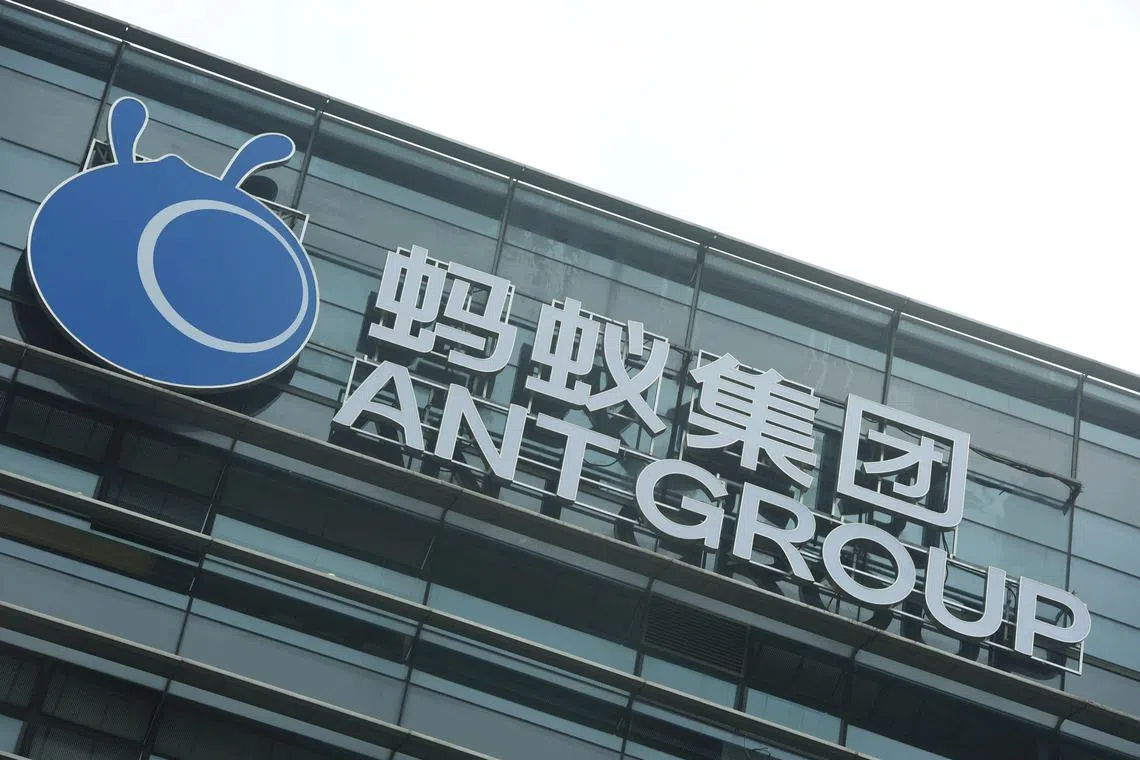Shares of Ant-linked firms rise after news of Jack Ma ceding control; Alibaba jumps 8.7%
Sign up now: Get ST's newsletters delivered to your inbox

Ant Group said over the weekend that founder Jack Ma will give up control of the company.
PHOTO: AFP
SHANGHAI - Shares of listed Chinese companies that count Ant Group as a major shareholder rose on Monday after announcements that Ant founder Jack Ma is giving up control of the fintech giant
Hong Kong-listed shares of Mr Ma’s Alibaba Group Holding closed up 8.7 per cent.
Shares of Longshine Technology Group, Jilin University Zhengyuan Information Technologies, Shanghai Golden Bridge Infotech, Orbbec and Hundsun Technologies also rose. Ant indirectly owns stakes ranging from slightly more than 5 per cent to over 20 per cent in those companies.
Ant said at the weekend that Mr Ma will give up control of the company. The overhaul seeks to draw a line under a regulatory crackdown that was triggered soon after its mammoth stock market debut was scuppered around two years ago.
Mr Redmond Wong, Greater China market strategist at Saxo Markets in Hong Kong, said Mr Ma’s ceding of control of Ant and other businesses would help remove some uncertainties and pave the way to develop and expand the group’s business.
“It should have removed some of the authorities’ concerns about the group as the change was likely a negotiated outcome with the authorities,” Mr Wong said. “And investor sentiment towards the China Internet sector is likely to improve further.”
Mr Guo Shuqing, head of the China Banking and Insurance Regulatory Commission (CBIRC), said in an interview with the official Xinhua news agency published on Jan 7 that rectification of the financial businesses of 14 platform companies has been “basically completed”, while a few remaining issues need to be resolved. He did not name the companies.
The authorities will adopt “normalised regulation” afterwards and encourage platform companies to operate in a compliant manner, he was quoted as saying.
Ant’s US$37 billion (S$49.2 billion) initial public offering (IPO), which would have been the world’s largest, was cancelled at the last minute in November 2020,
“Investors can stop guessing and can finally assign a risk premium to the new company that Ant was transformed to be,” said Mr Alexander Sirakov, managing partner at Aquariusx, a Shanghai-based investment consultancy.
Morgan Stanley said in a research note that it would elevate Alibaba to its “top pick” of stocks in China’s Internet industry in 2023, citing easing regulation as part of the reasons for its decision.
While some analysts have said relinquishing control could clear the way for Ant to revive its IPO, the changes announced on Saturday, however, are likely to result in a further delay due to listing regulations.
China’s domestic A-share market requires companies to wait three years after a change in control to list. The wait is two years on Shanghai’s Nasdaq-style Star market and one year in Hong Kong.
Ant said on Sunday it had no plans to initiate an IPO.
The CBIRC on Dec 30 approved a capital increase in Ant’s consumer finance arm to 18.5 billion yuan (S$3.6 billion) from 8 billion yuan in the latest step of its restructuring.
But Dr Li Nan, a finance professor at Shanghai Jiao Tong University, said Ant’s inherent problems remain after its change of control.
“The key problem in the business model of Ant is embedding loan (Huabei and Jiebei) wealth management and insurance in the payment platform (Alipay), evading the necessary risk management regulation, such as capital adequacy ratio, liquidity ratio as well as loan loss reserve ratio,” she said.
The leverage is still way too high after Ant’s capital increase, she added. REUTERS


